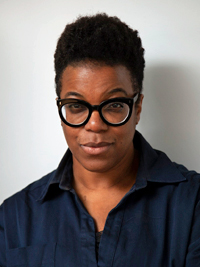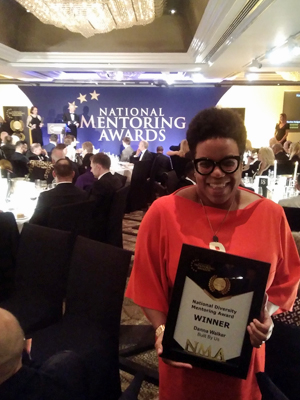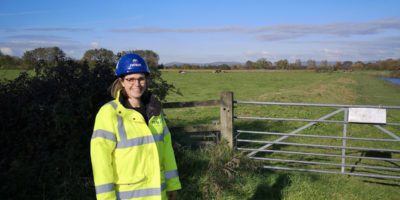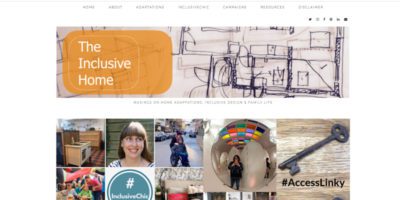Danna Walker is the founder and CEO of Built By Us, an award-winning social enterprise which exists to actively champion greater diversity and inclusion in the construction sector. Her career spans over 20 years in construction and built environment, encompassing various roles including electrician and architect, and within the field of vocational education. She is currently a board member of Public Practice and former charity trustee and was an elected board member for the Architects Registration Board.

“What construction has to get to grips with is being more inclusive and making this tangible. So, it’s not enough to say on your website that it’s all lovely but when people come and work in the office or on-site they hear language and see behaviours that don’t support that point of view, because they will leave, and they’ve been leaving for a very long time, or not even getting started.”
What BBU is up to now
Since we last spoke, Built By Us’ (BBU) ethos and mission remain the same, and, since 2017, the team has been very busy developing two new mentoring programmes of support.
BUILD is for those thinking about a career in construction or in the very early stages of their career. We have some speed mentoring events coming up soon.
SHAPE is a mentoring programme designed for entrepreneurs and founders which matches them with volunteers from a variety of backgrounds, experience and expertise to help develop their business plans or to grow their business. Applications for SHAPE will open at the end of November/early December.
Last, but by no means least, we have increased the number of people going through the FLUID programme, which has been supporting career progression and retention in the construction professions since 2012 and was recognised as a winner at the National Mentoring Awards 2019.
As well as our three mentoring programmes BBU has been building on its work with industry and actively supports forward-thinking organisations that want to build more inclusive working environments through learning workshops, through strategic support and through action planning.
For us, it’s incredibly important that BBU is not only advocating but that it’s able to take action to make tangible change and help others to make tangible change in the industry. As well as in-house training we are also helping to identify and to place diverse and talented practitioners and students into roles within these organisations and supporting both through the initial processes.
We are growing as an organisation and we continue to be a thriving enterprise with offices in Brixton now. My vision for BBU was always that we’d be a disruptor in the ecosystem not only of construction but of careers.
We still maintain an all age and intersectional approach to diversity. That means that no matter what stage you’re at in your career we are able to support growth and development for individuals and also for organisations. That manifests in two areas of work: the people side of the work and, what I call performance, alongside advocacy.
On a personal level, I’ve been involved in two BBC Radio 4 broadcasts. In 2018, I was invited to present the Architecture of Incarceration documentary, which explored the philosophy and ethos of modern prison design, and, more recently, I took part in the Race in Our Public Space debate.
Supporting entrepreneurs during such a difficult time
I’m particularly excited about the SHAPE programme because we are supporting people who are looking to set up businesses in such difficult times; they might be freelancers or sole traders, or their ambition might be looking to grow something bigger but the potential that has been overlooked for diverse leadership and diverse founders is something BBU wants to address, to support people on that journey to whatever their business might look like.
We are looking for a diverse range of businesses so whether you are a structural engineer, or you want to set up as a painter and decorator or in carpentry, we’d love to hear your business ideas.
What we will be providing as well as mentoring is information and support for a series of workshops. We are tremendously excited about the opportunity to help people as they navigate this new economic situation. Lots of people are being furloughed, losing work, having their salaries and/or hours reduced, so this could be an interesting time to set up a business.
The challenge of studying while working
When I was an electrician, I enrolled on a part-time access course in architecture. It was designed to encourage people who were underrepresented, particularly women, to get involved to better understand architecture and the built environment, and I’m incredibly grateful for the opportunity. It was Marina Adams who ran that course at London South Bank University, back then.
It was very exciting to be doing both things at the same time because in some ways they felt like such different worlds; on the trades’ side I was interacting with architects and asking them questions about drawings, and then I’d go to a class and explore ideas with model making, I’d be doing drawings and visiting buildings.
I think once the architecture bug nips you it’s hard to let it go. I still find myself fangirling over buildings and particular designers, even though I’m not in practice day-to-day now.
One of the biggest challenges for people who are underrepresented, even then, before the higher fees were introduced, is the cost of study. I was fortunate to be able to earn money but it’s very tiring to be working and then put your utmost into study.
My role is all about helping people
Now, my day to day work is about connecting to industry leaders, working with our beneficiaries, and leading the BBU team. We are a small organisation, so I get to do a bit of everything and that really suits my style of working. I get involved in so much of it.
I work with a wonderful team of people who offer and share their skills with us. Part of my role is supporting them to thrive in their roles. I enjoy seeing new members of staff development and find their own feet.
I also love to facilitate learning and workshops and day to day I do a huge amount of work around electronic data interchange with everybody from staff members to executive teams. I love this work. It’s an absolute passion and it feels like a privilege to be able to facilitate this learning and discussion.
I’ve also done lots of talks, most recently at the Bartlett School of Architecture and, in November, I’ve been invited to talk at the Festival of Place conference.
COVID impact is a really mixed picture
Lots of practices and consultancies are saying that projects have been put on pause by the economic uncertainty, so we’ve seen furloughing and redundancy as a short-term way of managing this.
New build, commercial and anything connected with retail is being hit hard, though some restaurants and hotels have taken the opportunity to refurbish.
It’s very hard to sum this up succinctly but overall, I think the impact has been to see a contraction in the amount of work that’s available and the number of projects ongoing, and we wait to see what’s next.
Not much change in gender balance
In construction, the number of women is stuck at around 11-13% for about 20 years according to the Office of National Statistics.
We have however seen a change in architecture, though there’s still a distance to travel, but I think according to the Architects Registration Board’s (ARB) figures for Chartered female architects it’s around 27% of female representation. In 1994, when I started studying architecture, it was around 12%.
The ARB has produced a piece of work that showed for architects under the 30-35 year age group the statistics are 50:50.
Where the gap stubbornly remains in female representation is in female leadership, so we are still not seeing large numbers of women either at the board table or leading their own practices.
This is one of the reasons SHAPE exists, so that we can address this very problem. It remains a challenge for women to be seen as leadership contenders and this is about stereotyping and women not being given the opportunity.
The construction sector stereotype NEEDS to be changed
There are a number of strands that BBU focuses on, including gender, race and ethnicity or people of colour, disability, LGBT+, socioeconomic disadvantage, and that work is really about exploring and tackling the culture of the industry.
If we want to future-proof our industry and our businesses, we really have to acknowledge that for a very long time there has been a very particular image and a very particular culture which is a turn off for a huge number of people. We can certainly see it in the data. We are an ageing sector so if we look at demographics around age there is a bulge around 45-55 which narrows towards the 60 age group.
That’s an issue because we are not able to attract new people into the industry and we’ve got a lot more competition now. If you’re a younger person at the start of your career and you’re into technology and art you might be attracted to tech or gaming development and as these are newer areas they aren’t necessarily weighed down with a particular image, or stereotype or culture.
What construction has to get to grips with is being more inclusive and making this tangible. So it’s not enough to say on your website that it’s all lovely but when people come and work in the office or on-site they hear language and see behaviours that don’t support that point of view, because they will leave, and they’ve been leaving for a very long time, or not even getting started.
If we want to make a difference, we have to make the industry more welcoming and more self-aware in terms of how behaviour and language impact other people.
I do wonder what it’s like for people at this moment no matter where they are working but particularly in an industry that’s had an issue historically with not treating all people well. If we can make changes in that, it won’t just impact people from BAME communities, but it will improve the industry.
I think diversity is the disruption we need for a better industry. It is not an accident that we have some of the highest rates of suicide as a sector. It’s tough to be in the sector, though in a number of ways, and it doesn’t seem to be very supportive. This suicide rate should be a major wake up call for the industry, and it doesn’t take into account all those suffering from addiction, anxiety and depression that underlie the numbers.
Excited for the future
2021 remains in some ways a bit of a mystery as we navigate the pandemic but what I’m really excited about is expanding our work under the new BUILD programme supporting those who might be leaving college and university, and the new SHAPE programme which supports people exploring entrepreneurship.
We look forward to continuing to grow our work with organisations and our opportunities to connect with people in our striving to achieve a more equal, diverse and inclusive industry and the built environment.
https://www.linkedin.com/in/danna-walker-067b0736/
https://twitter.com/walker_danna







